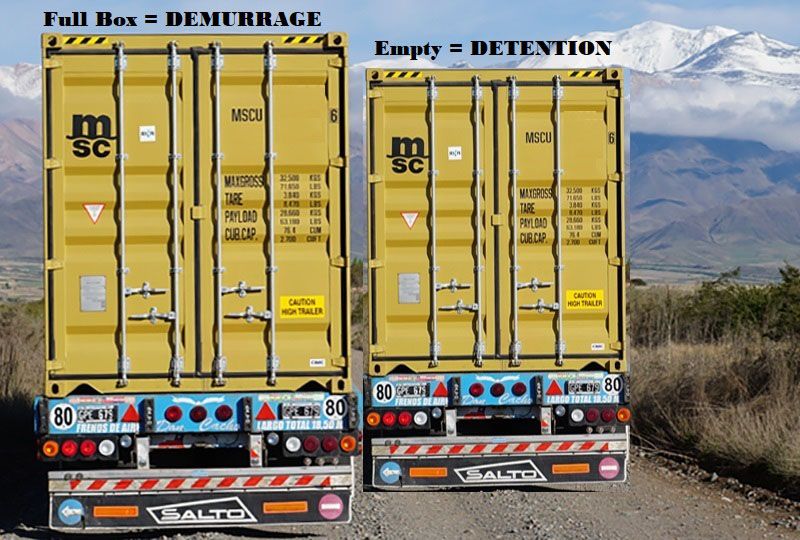
WORLDWIDE – In these unprecedented times the concern is that many companies, faced with strains put on their businesses through no fault of their own, may well go to the wall. The organisation which represents the international freight forwarding community has therefore put a proposition to all shipping lines, ports and terminals to exercise restraint in their levying of demurrage and detention charges.
The call comes from the International Federation of Freight Forwarders Associations (FIATA) which says whilst it is understandable that there is an inherent need to collect container and terminal storage charges, both to compensate the shipping company and to ensure a quick turnaround, these exceptional times, and the overriding need to ensure that global maritime supply chains remain intact, means a relaxation of the policies is required.
FIATA therefore has now invited shipping lines and all supply chain actors to take cognisance of the ‘incentive principle’, a term utilised by the US Federal Marine Council (FMC) as part of its proposed interpretative approach as to the reasonableness of demurrage and detention practices. FIATA reiterates the two main purposes of demurrage and detention charges as of its previous press release from November 2019, which acts both as:
Compensation to the shipping line for the use of its container
An incentive for cargo movement, ensuring that freight forwarders return containers as soon as possible for a fast turnaround
At the end of last year FIATA had already questioned ‘the reasonableness of demurrage and detention practices and to what extent the practices were meeting the intended purposes as financial incentives’ to promote freight and the timely movement of containers. This issue rings even truer in today’s Covid-19 situation. At that time FIATA Chair, Working Group Sea, Jens Roemer, commented:
“The clock for the determination of a charge of demurrage and detention to incentivise the orderly movement of containers through ports and terminals must be stopped when circumstances arise outside the control of the importer and containers are not able to be moved. There is no logic in enforcing a charge which is supposed to motivate the importer to pick up, or return, a container in a timely manner if the port or terminal is not able to comply with the delivery request.”
Under the incentive principle, where circumstances negate one of these core purposes of demurrage and detention, the reasonableness of their application should be questioned. As such, under this principle, the motive for demurrage and detention charges incentivising the quick movement of cargo is clearly not reasonable under the Covid-19 context.
The stringent restrictions imposed by governments on the movement of goods and persons to prevent the spread of the virus are causing a significant slowdown in global supply chains, and this may impact on the ability for many merchants to pick up their containers in a timely manner for reasons outside of their control. For this reason, FIATA encourages shipping lines to review their demurrage and detention charges to ensure that they are reasonable under the circumstances.
Such a review, FIATA says, should consider the possibility of waiving charges based on the second purpose of acting as an incentive. Instead, the focus should be on the more relevant purpose as compensation for the use of the container, noting that shipping lines themselves are trying to smooth the container flow through ports and importers are now unable in many places to arrange container delivery based upon government and regulator movement directions. It may also include consideration of how to provide greater flexibility in the payment of such charges, taking account of the difficulties faced by many of their partners.
As the Covid-19 crisis continues to develop, it will continue to challenge all stakeholders within global supply chains over the weeks to come. FIATA notes that this will involve many difficult commercial considerations for actors along the supply chain. Nevertheless, the global spread of Covid-19, together with lockdowns and governmental restrictions in many nations, will require the global forwarding community to provide practical solutions.
This may include, for example, the provision of warehouse space, or temporary solutions to move containers out of terminals or unload containers to limit possible charges as far as possible. In addition, shipping lines may wish to consider certain exemptions on detention and demurrage charges during certain periods, FIATA previously welcomed the decision of ocean carriers to do so in China during the extended Chinese New Year holiday amid the Covid-19 outbreak there.
FIATA goes on to say that, via its Director General, it will continue to engage closely with leaders from shipping, ports, and other related activities to ensure a coordinated understanding of the issues and to develop sensible, practical, and unified solutions.
Source:handyshippingguide
The opinions expressed herein are the author's and not necessarily those of The OLO News.
Quality Companies